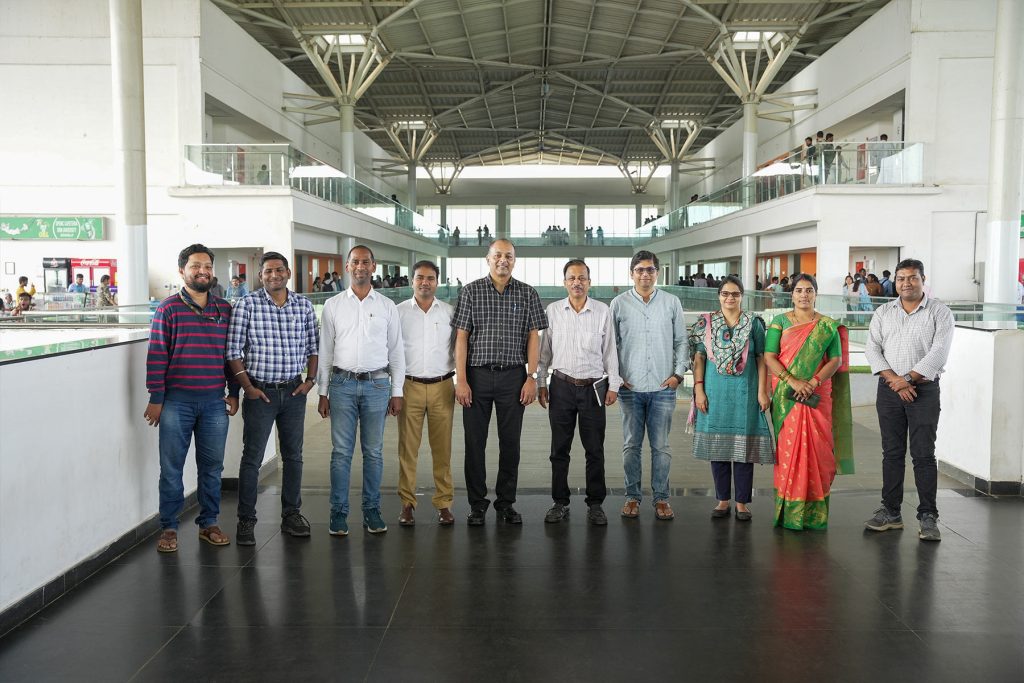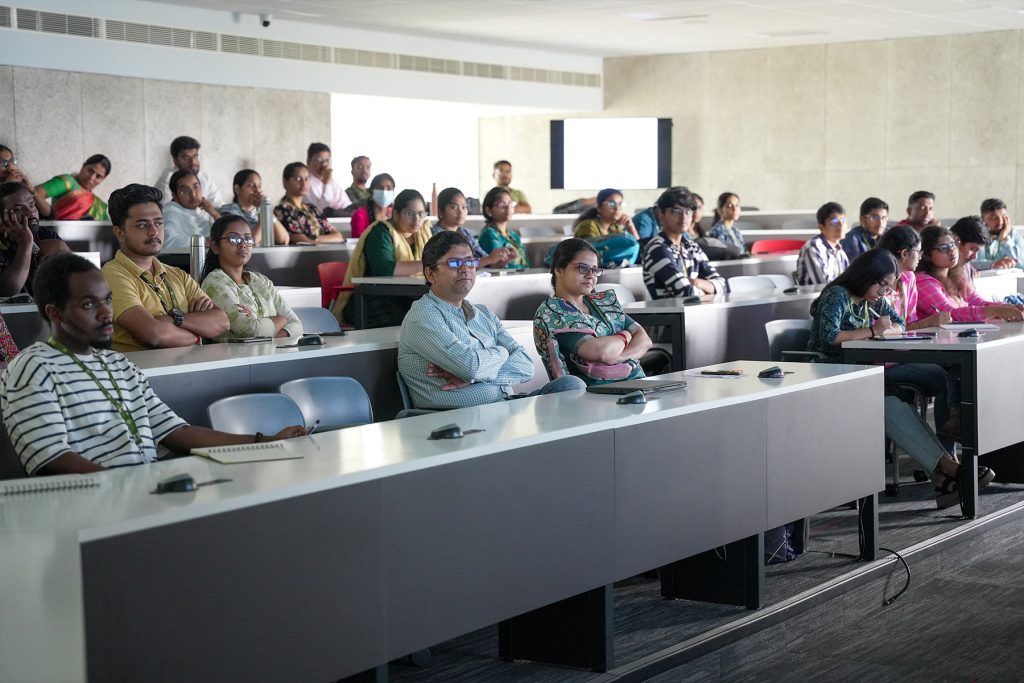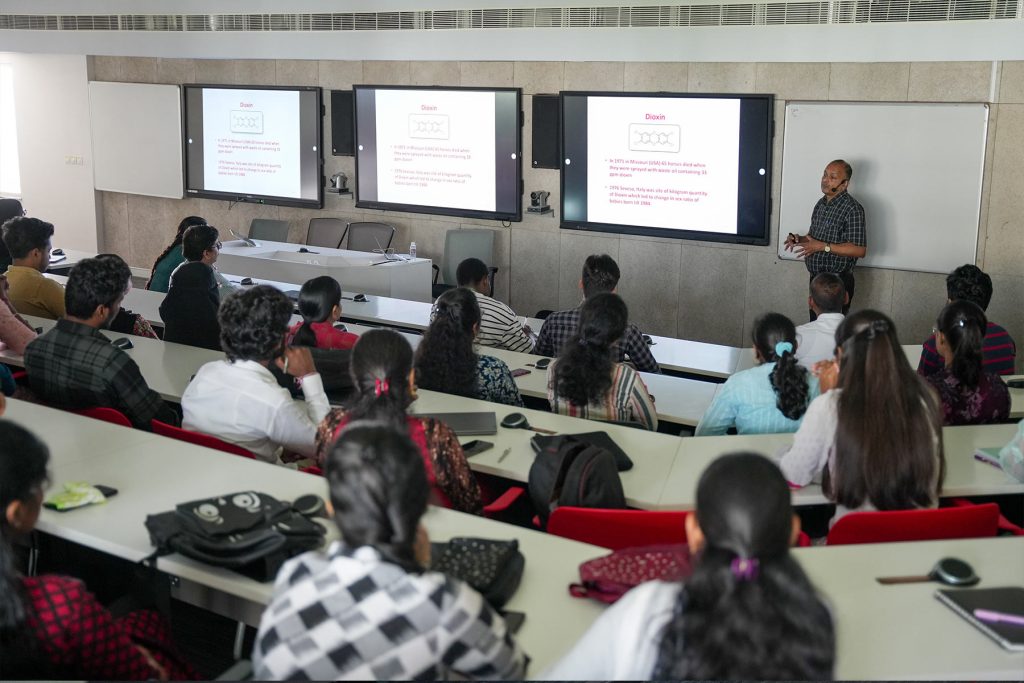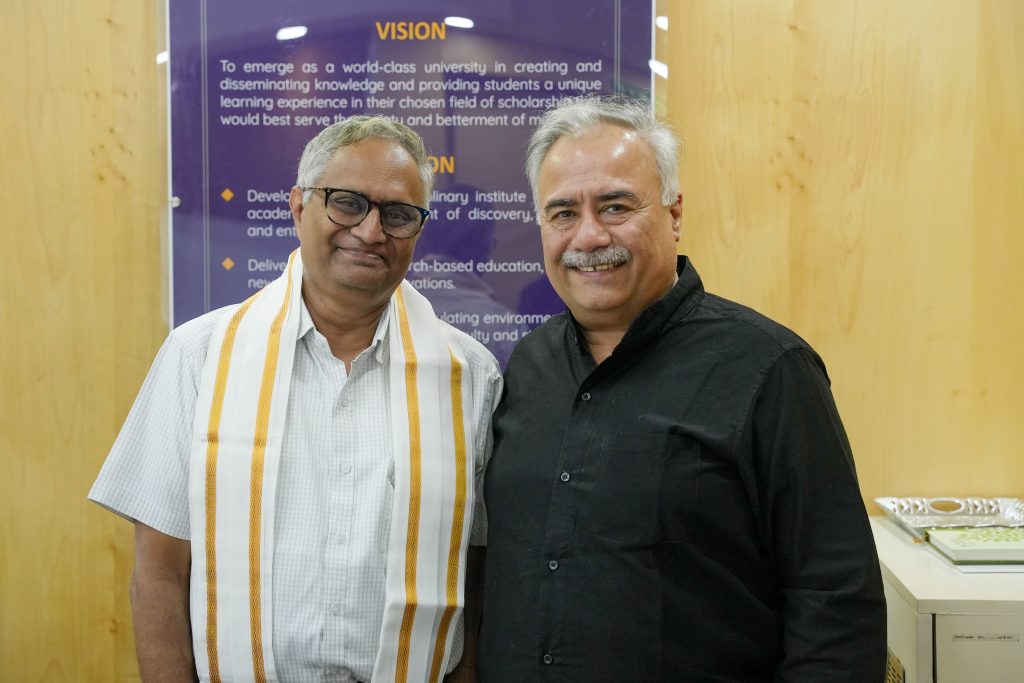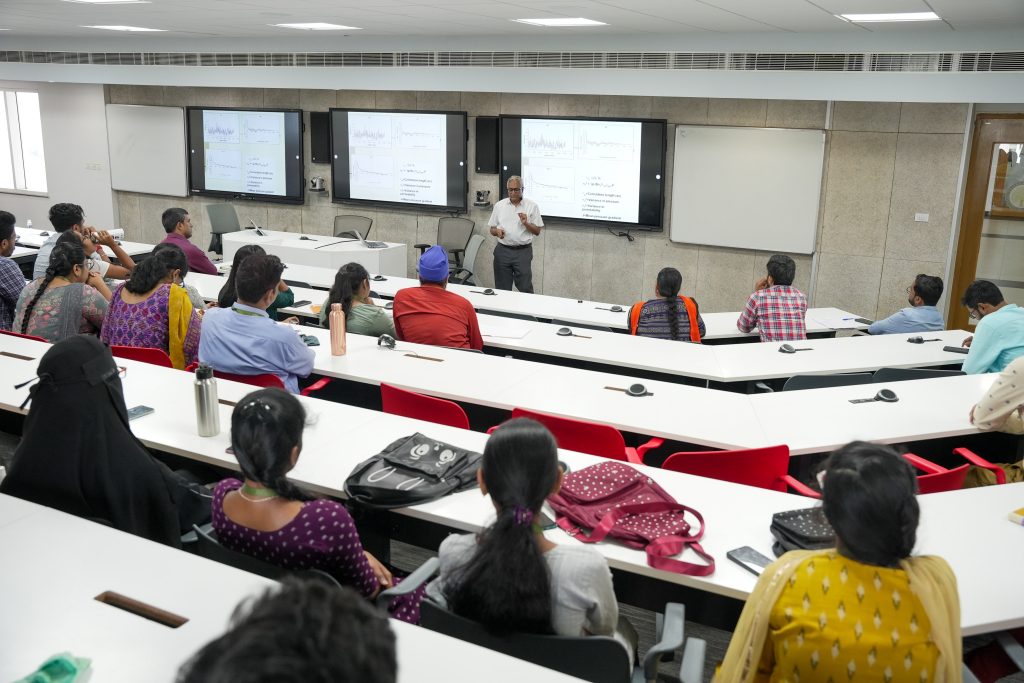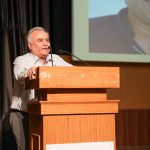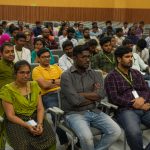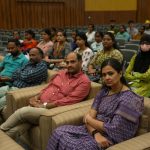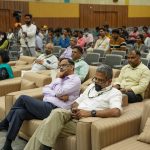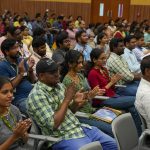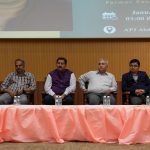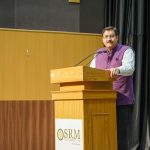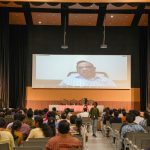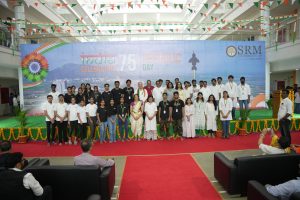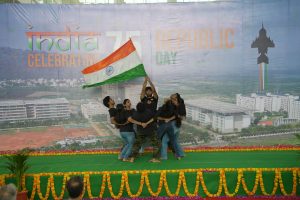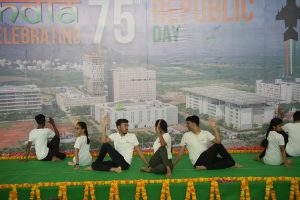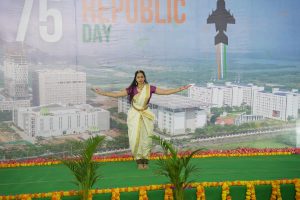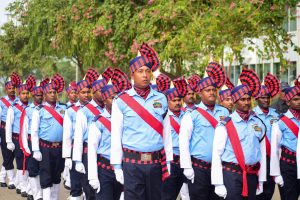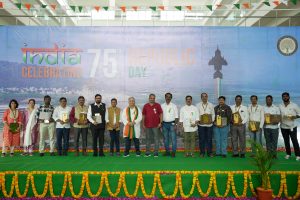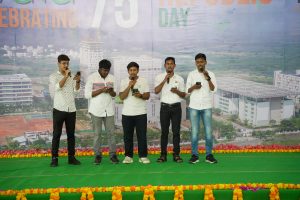Revolutionising Sustainable Living: A Discourse on Green Chemistry

In a world of fast-escalating environmental challenges, the idea of sustainability comes as a ray of hope for a safe and sound future. The present scenario calls for the kind of development that meets the needs of the present without compromising the future. In this regard, the Department of Chemistry at SRM University-AP organised a colloquium, that aimed to provide students with a comprehensive understanding of the concepts of Green Chemistry.
Dr Ram Mohan, an expert in the field of Green Chemistry and a renowned academician at the Department of Chemistry, Illinois Wesleyan University, delivered a lecture on the topic “Better Living Through Green Chemistry: An Introduction to Toxic Molecules”. Dr Mohan spoke elaborately on the grave dangers of toxic molecules and their adverse effects on the environment and human health. He raised awareness about the critical role of green chemistry in reducing the usage of such harmful molecules and replacing them with environmentally safe alternatives.
Dr Mohan also conducted workshops on “Better Living Through Green Chemistry”, as a continuation of his lecture. During the workshop, he quoted several case studies that showcased the benefits of using environmentally safe processes and chemicals in industry. These case studies demonstrated how the practice of green chemistry can lead to the development of numerous Eco-friendly processes and chemicals that have greatly improved human life and reduced environmental impact.
- Published in Chemistry-news, Departmental News, News
Rethinking Ionic Liquids as an Environment-friendly Solvent
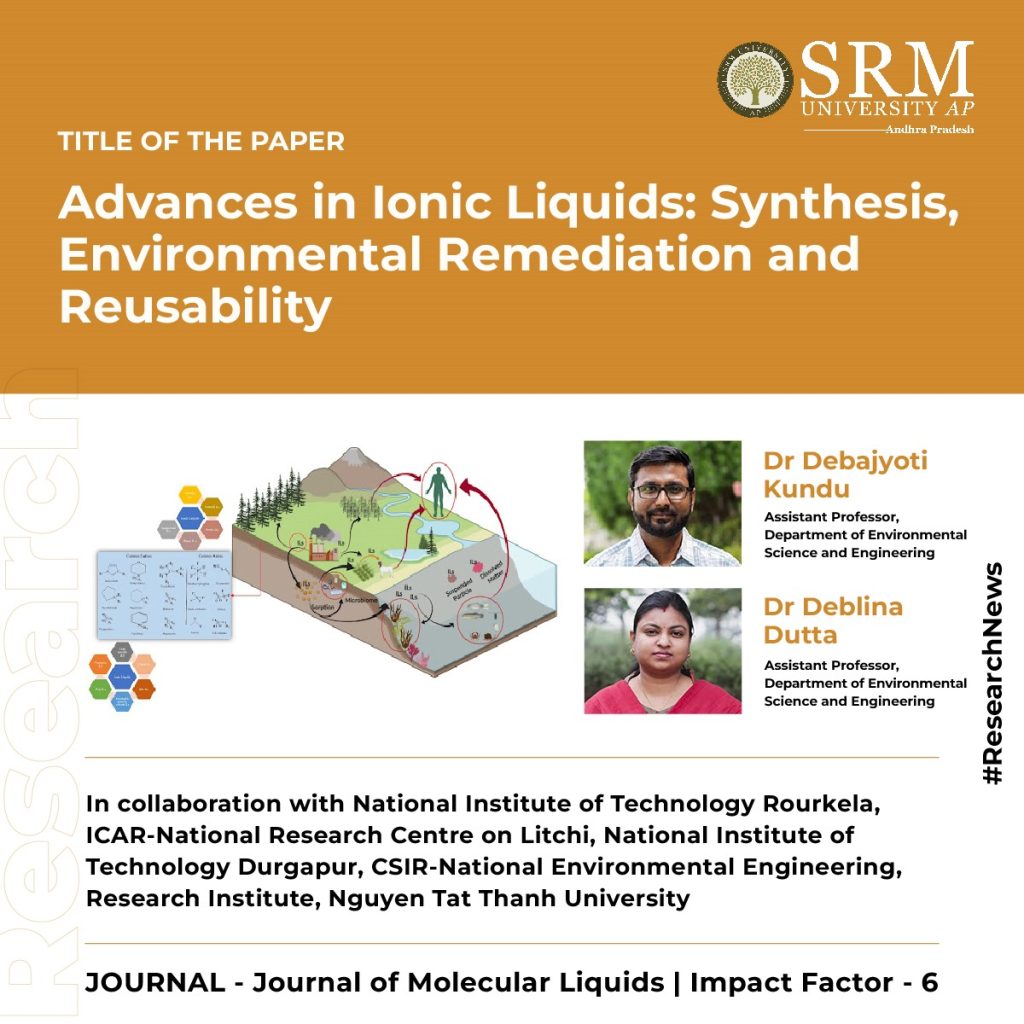
Dr Debajyoti Kundu and Dr Deblina Dutta, Assistant Professors, Department of Environmental Science and Engineering, have conducted seminal research on Ionic Liquids (ILs) in their paper “Advances in ionic liquids: Synthesis, environmental remediation and reusability” published in the Q1 journal, Journal of Molecular Liquids with an impact factor of 6. In the research article, the faculty duo have delved into the unique properties of ionic liquids, focusing on their role in environmental cleanup and showcasing their ability to combat pollutants. Various methods to recycle and reuse ILs, develop eco-friendly ILs, and scale up their application for effective environmental remediation have also been extensively explored.
Abstract
Ionic liquids (ILs) are next-generation solvents synthesised by organic salts, possessing negligible vapour pressure and low flammability. They possess high thermal and electrochemical stability, can be reused for multiple cycles, and their properties can be tuned according to the components used in their synthesis. Hence, ILs are considered to be potential alternatives for conventional organic solvents for numerous applications such as environmental remediation, nanoparticle synthesis, catalysts in various chemical reactions, solvents for the extraction of biomolecules from recalcitrant lignocellulosic biomass, etc. In this review article, the holistic approach of ILs, starting from various techniques adopted for their synthesis along with its critical review, is discussed, followed by a detailed discussion of the mechanism involved in the remediation of environmental pollutants using ILs. Further, in-depth documentation of various environmental pollutants remediated using ILs has been done to date. One of the major drawbacks of solvent application is the reusability factor, and hence, in this review article, techniques adopted to recycle/reuse ILs have been discussed. Further, the adverse effects of using ILs for environmental remediation have been comprehensively discussed to present a holistic view. Future studies should focus on synthesising environment-friendly ILs and their field-scale applications for environmental remediation.
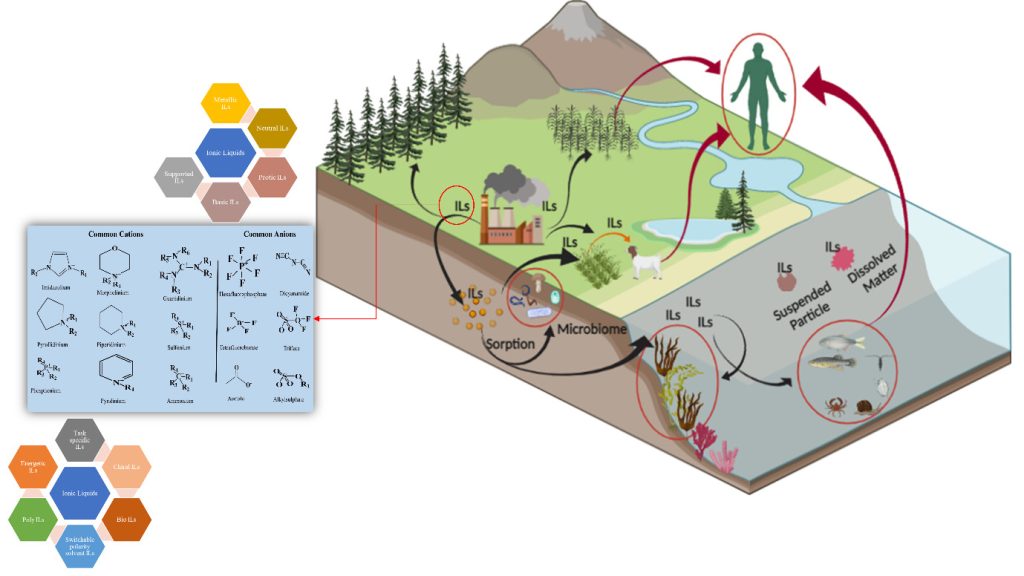
Practical implementation/social implications of the research
Their research on Ionic Liquids (ILs) presents a transformative approach to environmental challenges. By applying ILs on a larger scale for cleaning polluted air and water, promoting recycling and reusability, and developing eco-friendly ILs, the work has direct implications for industries and communities. The adoption of IL-based technologies contributes to efficient environmental cleanup and aligns with the growing societal demand for sustainable practices. Successful field-scale applications and public awareness initiatives can lead to a cleaner and healthier environment, demonstrating the tangible benefits of incorporating ILs into real-world solutions and fostering a more responsible and eco-conscious society.
Collaborations:-
- National Institute of Technology Rourkela
- ICAR-National Research Centre on Litchi
- National Institute of Technology Durgapur
- CSIR-National Environmental Engineering Research Institute
- Nguyen Tat Thanh University
Dr Kundu and Dr Dutta remarks that their future research in the realm of Ionic Liquids (ILs) will prioritise the development of environmentally sustainable synthesis methods, rigorous assessments of biodegradability and toxicity, and integrating ILs into industrial processes. Scaling up studies to evaluate their effectiveness in large-scale environmental remediation, investigating public perceptions, and fostering multidisciplinary collaborations with experts from diverse fields will be crucial for the responsible adoption of IL-based technologies. Additionally, focusing on life cycle assessments, exploration of novel applications, policy recommendations, and educational outreach can collectively contribute to advancing the understanding and practical implementation of ILs, ensuring a holistic and impactful approach to their environmental applications.
Click to read the article!
- Published in Departmental News, ENVS News, News, Research News
Success Mantra for Managers Concludes with a Resounding Success
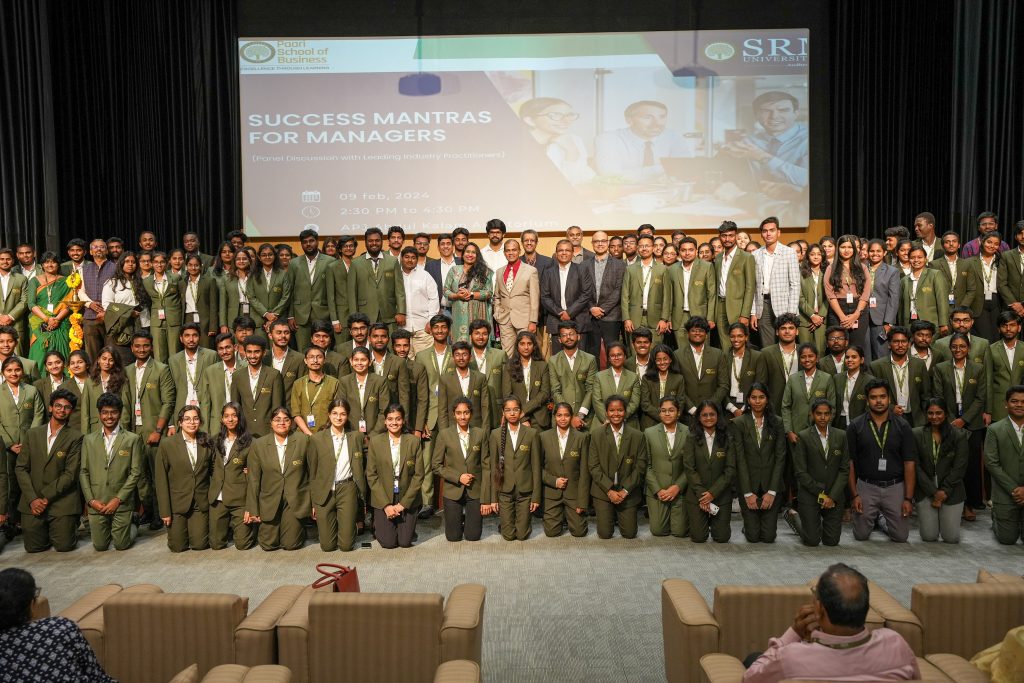
Paari School of Business, the management precinct of SRM University-AP, hosted a dynamic panel discussion titled “Success Mantras for Managers” with experienced entrepreneurs and industry experts. The four-member panel consisted of industry stalwarts from various fields of management and the keynote speaker, Mr Mukesh Jain, who is the CTO, VP & Global Head of People Analytics.
During the event, Prof. Bharadhwaj Sivakumaran, the Dean of the Paari School of Business, explained the purpose and significance of the event. He highlighted that the panelists had gained practical experience by failing and bouncing back, as well as observing and learning from people throughout their careers, and could provide insights on what it takes to succeed in the corporate world. Mr Mukesh Jain, the keynote speaker, shared his wisdom and motivation during the event. He stated, “the key skill one needs to possess as an entrepreneur is to have a good understanding of how things work”.
The panel discussion that followed Mr Jain’s speech was moderated by Mr Sidharth Shankar Tripathy, a Harvard alumnus and the present Director of Entrepreneurship and Innovation at SRM University-AP. The discussion was insightful and inspiring as Mr Tripathy posed thought-provoking questions to the panel members.
Mr Tripathy started the discussion with a stimulating idea, stating that a mantra is a successful formula that has the power to transform. He questioned the panel members about the criticality of the idea of corporate athleticism and received an astounding response from Mr Nayanjyoti Goswami, Managing Director, Finance Operations & Strategy, State Street, who stated that it is often less about degrees and more about one’s attitude to work.
Mr Satish Rajarathnam, Head of People & Administration, RCG Global Services emphasised the need for collaboration and networking as a leader. He also highlighted the importance of functional knowledge, communication, networking and marketing skills. Ms Jyothsana Kuchimanchi, Senior Director- United Health Group, explained that change is an integral part of a manager’s life, and a manager should always be ready to adapt and upskill oneself to cope with changes.
Mr Anandan Jayaraman, COO FCC, Society Generale Global Solution Centre discussed the need for a manager to empathise with the customer and team members by putting himself in their shoes. The dynamic members of the panel cited the importance of self-learning and self-training, which can motivate team members, suggesting that a leader is a reader and should always update and upskill himself.
The panel discussion was an absolute game-changer. The insights shared by the speakers were incredibly valuable and contributed to the student’s understanding of what it takes to be a successful manager.
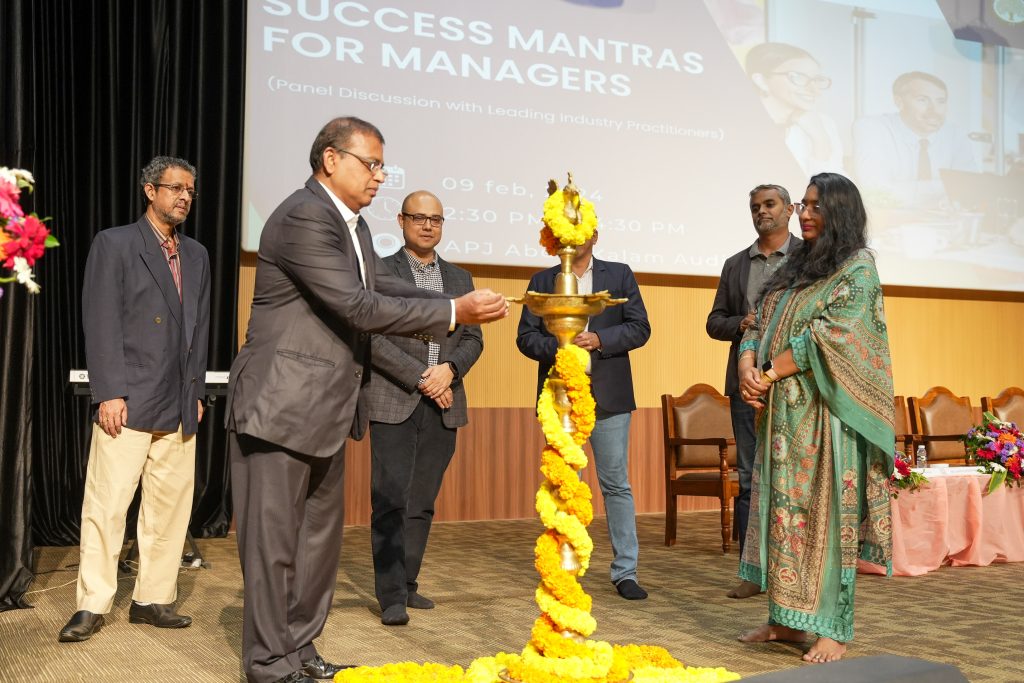
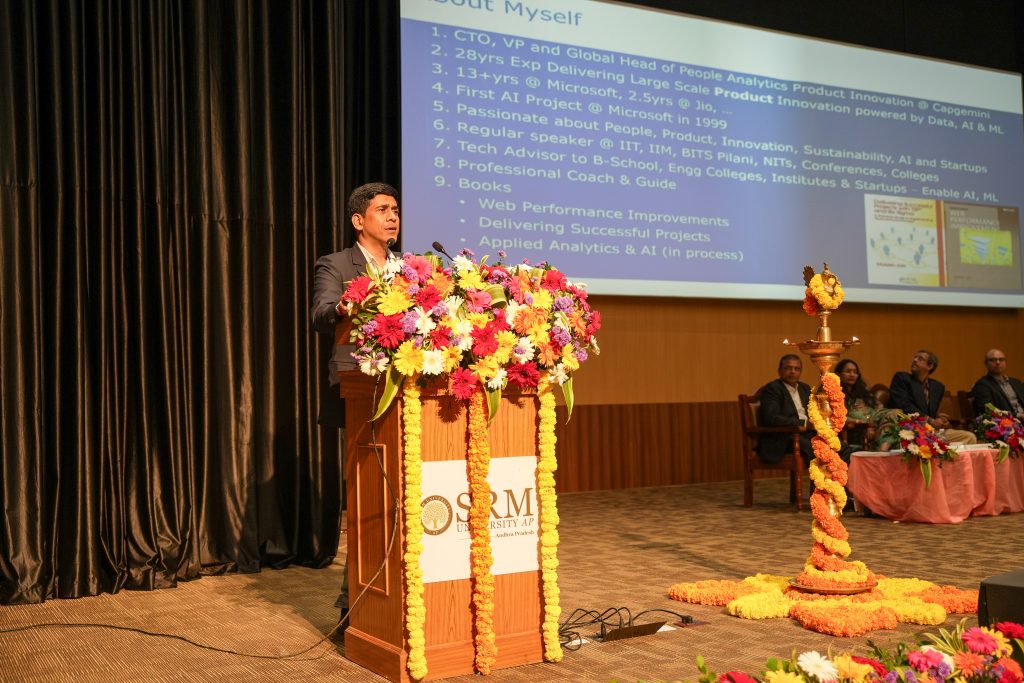
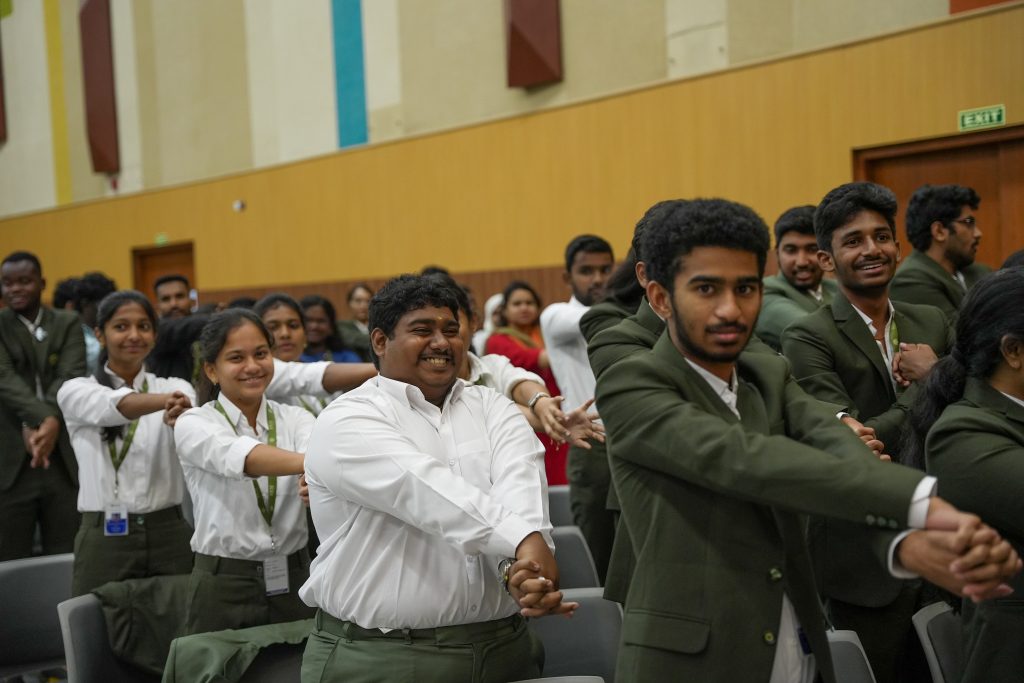
- Published in Departmental News, News, Paari Current Happenings, paari-events
Dr Dhamodharan Invited for Workshop on Youth Leadership
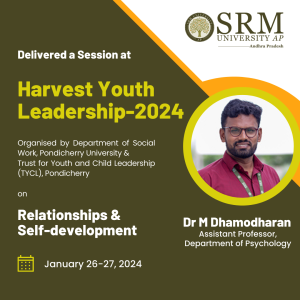 Dr M Dhamodharan, Assistant Professor in the Department of Psychology, was invited as a resource person to deliver a session on “Relationship and Self Development “from January 26-27, 2024, at the Two Days workshop on “Harvesting Youth Leadership-2024.”The workshop was organised by the Department of Social Work at Pondicherry Central University in collaboration with the Trust for Youth and Child Leadership (TYCL), Pondicherry.
Dr M Dhamodharan, Assistant Professor in the Department of Psychology, was invited as a resource person to deliver a session on “Relationship and Self Development “from January 26-27, 2024, at the Two Days workshop on “Harvesting Youth Leadership-2024.”The workshop was organised by the Department of Social Work at Pondicherry Central University in collaboration with the Trust for Youth and Child Leadership (TYCL), Pondicherry.
Dr Dhamodharan’s expertise and insights on the topic added value to the workshop, which aimed to empower young individuals and cultivate leadership skills among the youth. The session provided a platform for participants to delve into the dynamics of relationships and personal growth, essential aspects for nurturing effective leadership qualities.
His contribution towards the event underscored the importance of understanding the link between relationships and self-development in the context of youth leadership.
Abstract
Relationship is a continuing and often committed association between two or more people, as in a family, friendship, marriage, partnership, or other interpersonal links in which the participants influence each other’s thoughts, feelings, and actions (APA,2020).
The connections we set up, the several types of love we meet, and the effects these interactions have on our personal development all have a significant impact on how we live as people. Understanding the many kinds of relationships that exist is the first step in any analysis of relationships.
Every sort of relationship, whether it be sexual or platonic, professional or familial, has its own dynamics, obstacles, and expectations. In the context of human relationships, love manifests as a complex and profound energy. Love affects the core of who we are and transcends cultural barriers in all its manifestations. Numerous love typologies have been proved by academics and psychologists to classify and understand these types. Love has many sides, ranging from the Greek concepts of Agape, Eros, and Philia to contemporary psychiatric theories. This investigation looks at the subtle differences between various kinds of love, emphasising the behavioural, cognitive, and emotional aspects of each.
A foundational work in the field of psychology, Sternberg’s Triangular Theory of Love is at the core of understanding love. According to this theory, love can be viewed as a triangle made up of three essential elements: commitment, passion, and intimacy. It explores the significance of each ingredient and how they interact to shape the different manifestations of love through a thorough investigation of Sternberg’s theory. The talk explains the practical applications, providing a window into how the theory may be used to understand and negotiate the intricacies of real-world interactions.
Furthermore, a comprehensive knowledge of the human experience requires the inclusion of self-development in the conversation about love and relationships. In all their manifestations, relationships function as mirrors that reflect our advantages, disadvantages, and potential growth areas. The reciprocal effects of relationships, love kinds, and self-development are particularly important in human life. Also explains. how people change because of their relationships, moulding and honing their identities to fit the demands of romantic relationships and close relationships.
Finally, this session might give light on the complex interactions that exist between self-development, Sternberg’s Triangular Theory, love categories, and relationship types. Participants may understand more about the complex interplay between love and personal development as well as the enormous impact that connections have on forming our identities by exploring these interconnected domains. This talk might give insightful guidance for the participants to navigating the intricate web of interpersonal interactions, supplying a road map for cultivating meaningful connections and promoting comprehensive self-development.
- Published in Departmental News, News, Psychology News
Exploring Potential Collaboration with SUNY ESF
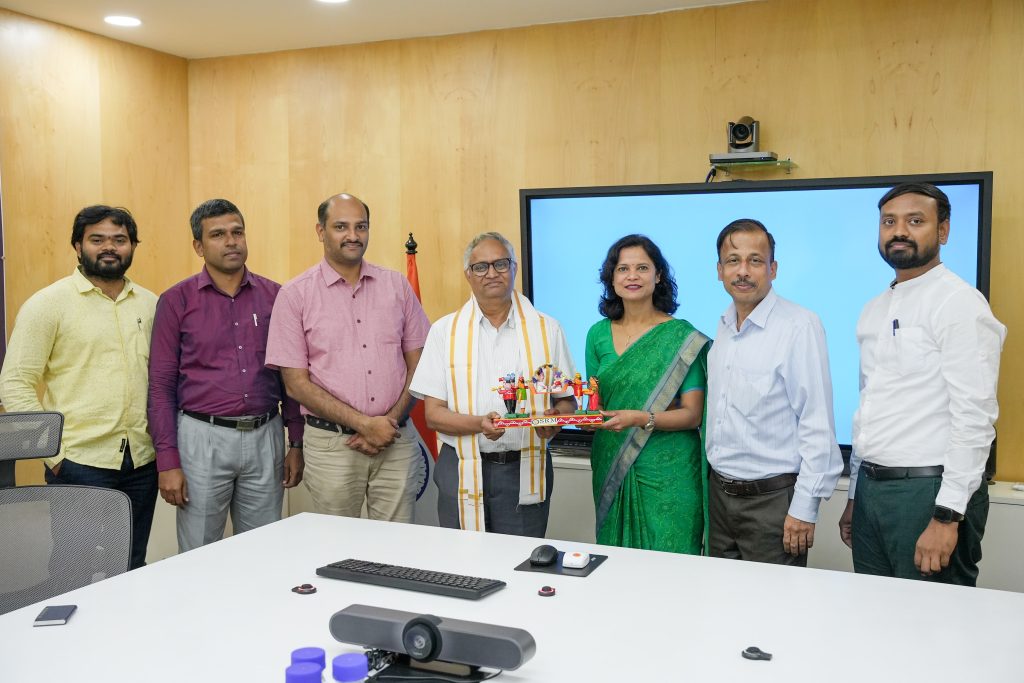
Prof. Bandaru Ramarao, who currently serves as the Chair of Chemical Engineering at SUNY College of Environmental Science and Forestry, visited SRM University-AP to explore potential collaborations between the two prestigious institutions.
During his visit, Prof. Ramarao conducted an engaging session with the Vice Chancellor, Prof. Manoj K Arora; Director of International Relations and Higher Studies (IR&HS), Ms Aditi Jain; and senior members of the faculty where they discussed various opportunities for collaboration, including the possibility of establishing an association for Masters and Ph.D. students, faculty and student exchange programmes, and scholarship collaborations for faculty members. Dr Jayaseelan Murugaiyan, Associate Dean in-charge of Sciences, proposed that the varsity could opt for a co-guide system between SUNY ESF and SRM AP.
Prof. Ramarao also delivered a seminar focused on “Techniques for Analysis of Transport Processes in Fibrous and Porous Media,” which was attended by enthusiastic masters and research scholars from the Department of Environmental Science and Engineering. The session was highly informative and provided valuable insights into the techniques used for analysing transport processes in fibrous and porous media. The event concluded with an interactive Q&A session. A token of appreciation was presented to Prof. Ramarao, culminating the visit into a huge success and paving the way for fruitful collaborations between the two institutions in the future.
A Study on Sustainable Organisational Development in the IoT Era
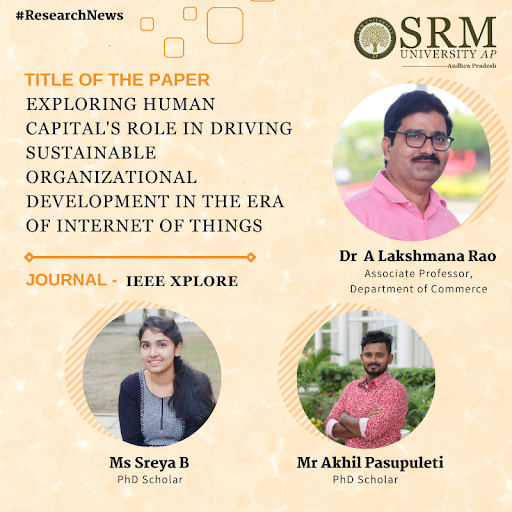 Human capital plays a crucial role in shaping an organisation’s growth in today’s digital age. It’s the idea generated by the human capital that leads to innovation. Dr A Lakshmana Rao, Associate Professor, Department of Commerce, along with his research scholars Ms Sreya B and Mr Akhil Pasupuleti, conducted a comprehensive study on human resource management in the information technology sector of Kerala. Their research paper titled “Exploring Human Capital’s Role in Driving Sustainable Organisational Development in the Era of Internet of Things” focuses on 320 participants from Kochi Infopark and investigates the impact of the Internet of Things (IoT) on their lives.
Human capital plays a crucial role in shaping an organisation’s growth in today’s digital age. It’s the idea generated by the human capital that leads to innovation. Dr A Lakshmana Rao, Associate Professor, Department of Commerce, along with his research scholars Ms Sreya B and Mr Akhil Pasupuleti, conducted a comprehensive study on human resource management in the information technology sector of Kerala. Their research paper titled “Exploring Human Capital’s Role in Driving Sustainable Organisational Development in the Era of Internet of Things” focuses on 320 participants from Kochi Infopark and investigates the impact of the Internet of Things (IoT) on their lives.
Abstract
The Internet of Things (IoT), a network of interconnected devices and sensors linked through the Internet, facilitates the connection between individuals, their devices, and vast amounts of data. Within companies, the human resources department plays a crucial role in managing the pressure generated by various aspects, including marketing, development, and the application of IoT in human resources. This study is motivated by the need to understand the potential of IoT in strategic human resource management practices. To explore the fundamental strategic human resource management practices and assess their mediating effects, this research gathered data from 320 respondents in the Kerala information technology sector, specifically Kochi Infopark, consisting of both lower-level executives and senior managers. The study utilises statistical analysis to examine the relationship between sustainable human resource practices, the Internet of Things, and sustainable human resource growth. Furthermore, the study highlights the IoT’s role as a mediator between strategic human resource management practices and factors contributing to sustainable HR growth, demonstrating a positive impact of independent variables on dependent variables. These findings emphasise the potential for organisations to enhance HR practices, decision-making, and innovation using IoT during crises and uncertainties. Integrating IoT with SHRM empowers organisations to effectively manage challenges and complex environments.
Practical Implementation
a) Employee Monitoring Systems: Implement IoT-enabled employee monitoring systems using sensors and wearable devices. This allows organisations to collect data on employee activities, health, and work environments. Analysing this data helps identify patterns, optimise resource allocation, and enhance overall employee well-being.
b) Talent Management Solutions: Utilise IoT devices to gather data on employee skills, competencies, and training needs. This information is valuable for developing personalised training programs, creating career paths, and strategising succession plans. Integrating IoT into talent management aligns HR practices with evolving workforce needs, leading to improved satisfaction and retention.
c) Remote Work Solutions: In times of crisis, such as the COVID-19 pandemic, leverage IoT-enabled remote work solutions. These solutions facilitate seamless communication, collaboration, and virtual team management. Integrating IoT with HR practices enables organisations to effectively manage remote workforces, maintain employee engagement, and adapt to challenging circumstances.
Social Implications
a) Improved HR Practices: Integrating IoT with HR practices enhances decision-making and fosters innovation. This, in turn, contributes to improved HR practices, ensuring that organisations are equipped to address contemporary challenges and complexities.
b) Employee Well-being: The use of IoT in employee monitoring systems promotes a holistic approach to employee well-being. Organisations can proactively address health and safety concerns, leading to a healthier and more engaged workforce.
c) Skill Development and Career Growth: IoT-driven talent management solutions contribute to individual skill development and career growth. Employees benefit from personalised training programs, creating a positive impact on professional development.
d) Crisis Adaptability: The integration of IoT in remote work solutions demonstrates organisational adaptability during crises. This not only ensures business continuity but also highlights a commitment to employee welfare in challenging situations.
e) Technological Advancement: Embracing IoT showcases an organisation’s commitment to technological advancement. This can enhance the organisation’s image, attracting top talent and positioning it as an industry leader.
Future Research Plans
In their upcoming research endeavours, the trio will focus on unlocking the bottlenecks of IoT-driven remote work dynamics and its influence on collaboration, productivity, and employee well-being in the post-pandemic context. They also plan on exploring the impact of interconnected devices on the moonlighting behaviours of employees and employment trends in IT firms and among professionals.
We wish the trio all success in their future endeavours.
- Published in Commerce Current Happenings, Departmental News, News, Research News
UDL on Scientific Progress and Market Paradigms by Dr Girish Sahni
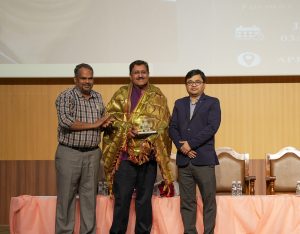 SRM University-AP proudly hosted the seventeenth edition of the University Distinguished Lecture series on the topic “Scientific Progress to Grand Progression: Opportunities and Challenges in Science-to-Technology-to-Market Paradigms.” The event took place on January 25, 2024, and featured an enlightening address by Dr Girish Sahni, Former Director General of CSIR and Former Secretary of the Government of India.
SRM University-AP proudly hosted the seventeenth edition of the University Distinguished Lecture series on the topic “Scientific Progress to Grand Progression: Opportunities and Challenges in Science-to-Technology-to-Market Paradigms.” The event took place on January 25, 2024, and featured an enlightening address by Dr Girish Sahni, Former Director General of CSIR and Former Secretary of the Government of India.
The lecture centered around the dynamic relationship between scientific progress and its translation into marketable technologies. Dr Girish Sahni shed light on the immense opportunities and challenges that arise in the process of transforming scientific advancements into tangible solutions for society. He emphasised the crucial role of imagination and concentration in fostering innovation, which ultimately leads to groundbreaking inventions. Dr Sahni’s thought-provoking discourse resonated with the audience, inspiring them to embrace curiosity and innovation in their pursuit of scientific excellence.
Following the lecture, an engaging Q&A session allowed the attendees to further explore the nuances of the topic and seek clarification on various aspects of science-to-technology-to-market paradigms. The interactive session fostered an environment of intellectual exchange and provided valuable opportunities for the audience to engage.
Reflecting on the significance of the University Distinguished Lecture, Prof. Manoj K Arora, Vice Chancellor of SRM University-AP, remarked, “The lecture by Dr Girish Sahni illuminated the critical role of scientific progress in driving grand progression. It highlights the opportunities and challenges that lie before us in translating scientific advancements into meaningful technological solutions that can benefit society at large”.
The event was skillfully moderated by Dr Sutharsan Govindarajan, Assistant Professor, Department of Biological Sciences. Dr J P Rajapandiyan, Assistant Professor of Chemistry, expressed his appreciation for the enlightening lecture delivered by Dr Girish Sahni. He highlighted the significance of such platforms in fostering a culture of research and innovation within the university and beyond. Prof. Ranjit Thapa, Dean of Research, and Dr Vinayak Kalluri, Dean of Academic Affairs, presented a memento on behalf of the institution as a token of respect and appreciation for his esteemed presence at the seventeenth edition of the University Distinguished Lecture series.
This event stands as a testament to SRM University-AP‘s dedication to academic excellence and its ongoing efforts to provide students and faculty with enriching opportunities for intellectual growth and exploration.
- Published in News, Research News
“A University That Resonates with the Nation”: 75th Republic Day Celebrations
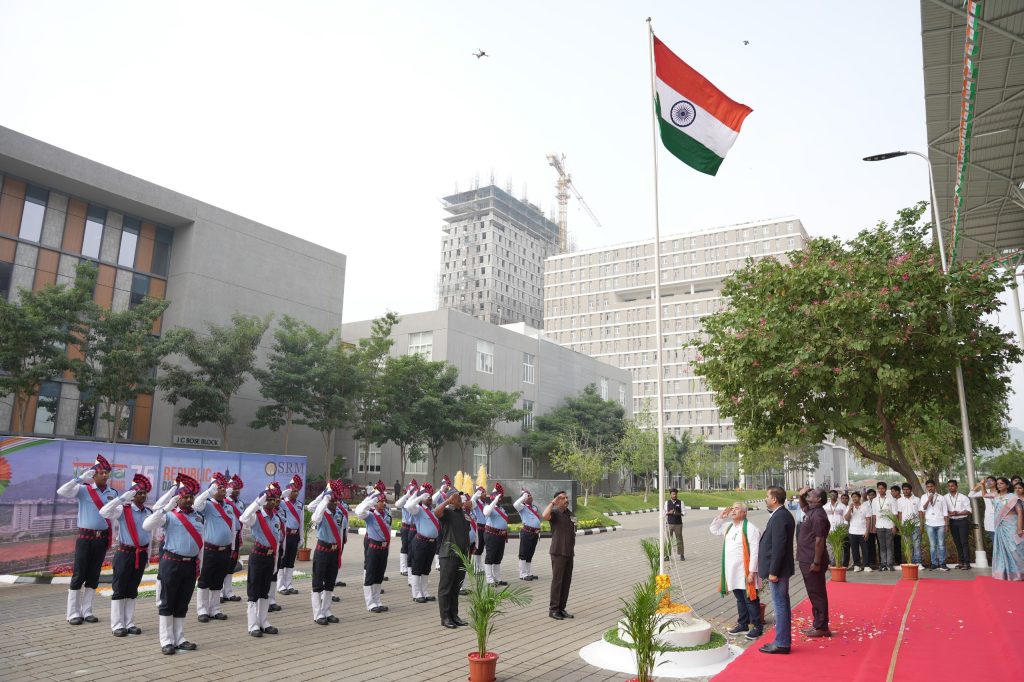
SRM University-AP celebrates the 75th Republic Day with a grand amalgamation of pleasure, pride and patriotism. Vice Chancellor of the university, Prof. Manoj K Arora unfurled the national flag commemorating India’s journey as a secular, social, republic and democratic nation. The celebration was also joined by the Panchayat secretaries of the neighbouring 5 villages – Neerukonda, Kanteru, Nidamaru, Kuragallu and Pedaparupudi who were felicitated by the Vice Chancellor and Dr Vinayak Kalluri, Dean – Academic Affairs. These villages have been adopted by the university to develop into smart villages through student projects and ventures.
“On this momentous day, let us remember the golden heritage of our nation and pay homage to the architect of our constitution, Dr B R Ambedkar. Let us strive towards achieving Viksit Bharat@2047 by channelling the energy and intellect of our youth into developing our nation and society and shaping students into global citizens“, said Prof. Arora as he addressed the campus community that had gathered to celebrate the auspicious day. The Vice Chancellor also emphasised the pivotal role of an educational institution in enlightening the students on constitutional rights and moulding them into reasonable and responsible citizens of the country. He also delivered a comprehensive report on the progress and growth of the university in one academic year highlighting the numerous achievements and recognitions secured by the students, scholars and faculty in academic, research, entrepreneurship and other frontiers.
The Republic Day celebrations commenced with an awarding ceremony where staff who had completed 5 years of service at the university were bestowed with a token of appreciation and gratitude. Students were awarded accolades for victories at various competitions at South Zone championships and Bravery awards were presented to security personnel and staff who rendered their service during calamities. A parade by the university security personnel paying tribute to the country and various cultural programmes by students resonating with patriotic fervour were highlights of the event.
- Published in News, student affairs news, University Event
Dr Ghanshyam Pandey Invited as Guest Speaker at BITS Pilani, Goa
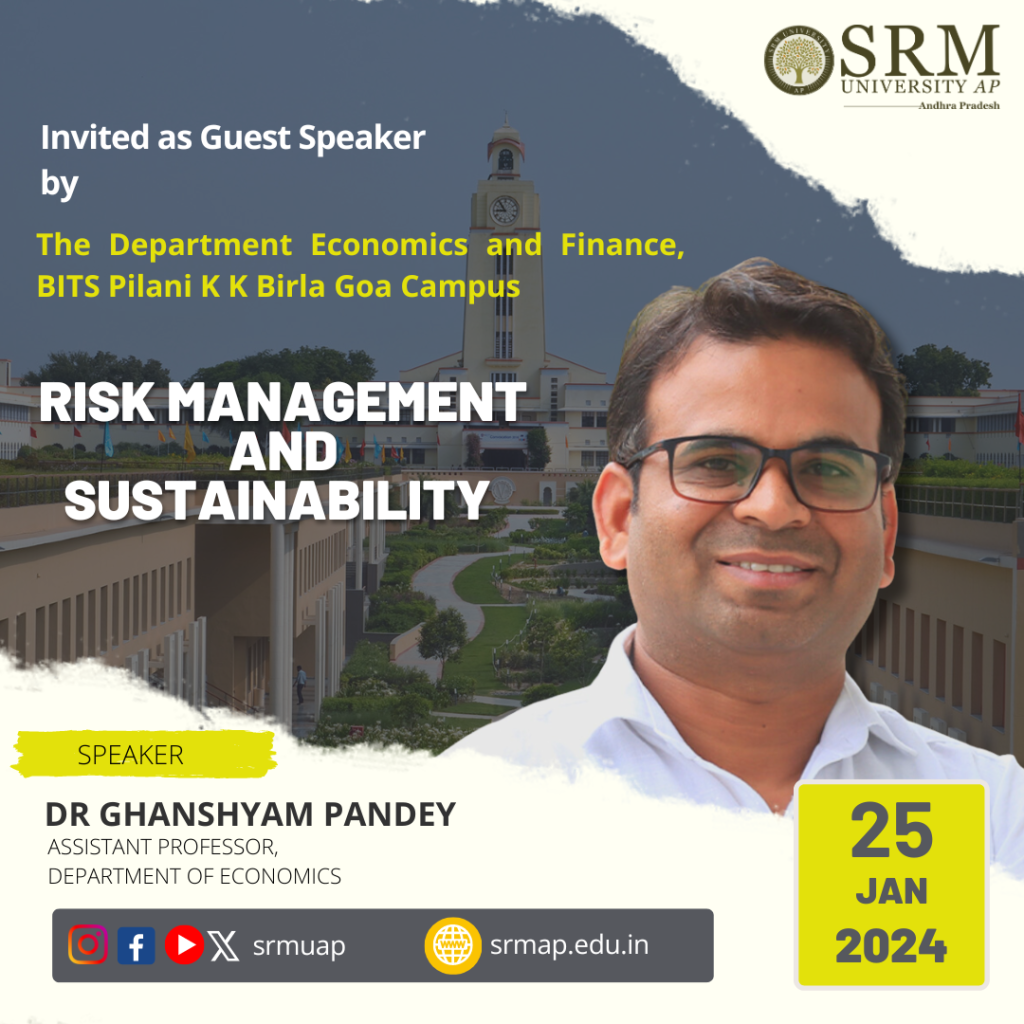
Dr Ghanshyam Pandey, an Assistant Professor at the Department of Economics, has been invited to deliver a talk on Risk Management and Sustainability on January 25, 2024, at the Department of Economics and Finance, BITS Pilani K K Birla Goa Campus.
Dr Pandey is a distinguished member of SRM University-AP’s teaching faculty and an accomplished economist with numerous publications to his credit. He has led several prestigious government-sponsored projects and is the Principal Investigator for the NABARD-sponsored project titled, “Tenancy and Credit: Exploring Facts below the Crust in AP”.
- Published in Departmental News, Economics Faculty, Economics News, News
A Scholarly Perspective on Incumbency to Dominance
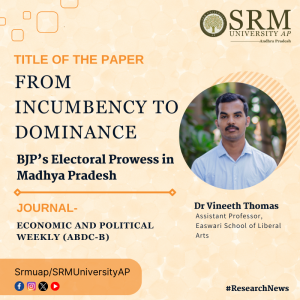 We are pleased to announce the publication of an insightful article titled “From Incumbency to Dominance: BJP’s Electoral Prowess in Madhya Pradesh,” in the prestigious ABDC-B journal, Economic and Political Weekly (EPW). This article, authored by Dr Vineeth Thomas, Assistant Professor in the Easwari School of Liberal Arts provides a comprehensive analysis of the BJP’s journey from being an incumbent party to establishing dominance in the state’s political landscape.
We are pleased to announce the publication of an insightful article titled “From Incumbency to Dominance: BJP’s Electoral Prowess in Madhya Pradesh,” in the prestigious ABDC-B journal, Economic and Political Weekly (EPW). This article, authored by Dr Vineeth Thomas, Assistant Professor in the Easwari School of Liberal Arts provides a comprehensive analysis of the BJP’s journey from being an incumbent party to establishing dominance in the state’s political landscape.
Dr Thomas examines the factors that have contributed to the BJP’s electoral success in Madhya Pradesh, including the party’s organisational strength, leadership, and strategic alliances. The article also delves into the impact of various government policies and initiatives on the BJP’s electoral performance in the state.
Dr Thomas’s expertise in political analysis and his meticulous approach to the subject matter make this article a significant contribution to the scholarly discourse on Indian politics, particularly within the context of Madhya Pradesh. This research also enriches our understanding of contemporary political landscapes and aligns with our commitment to academic excellence.
Congratulations to Dr Vineeth Thomas for this impactful contribution to political scholarship!
Abstract
In the 2023 Madhya Pradesh Assembly election, the Bharatiya Janata Party (BJP) emerged victorious with a landslide majority. This electoral triumph, characterised by a significant mandate for the BJP, has undoubtedly reshaped the political dynamics of Madhya Pradesh. The landslide victory underscores the party’s stronghold in the region and signals a decisive mandate for the BJP to govern the state for the designated term. In this context, this article analyses various strategic factors that cleared the BJP’s path from incumbency to dominance in Madhya Pradesh.
Explanation of Research in Layperson’s Terms
In the dynamic landscape of Indian politics, Madhya Pradesh stands as a crucible of electoral battles, where the ebb and flow of political tides have shaped the destiny of the state. At the heart of this electoral competition lies the Bharatiya Janata Party (BJP), an entity that has not only weathered the storm of time but has also evolved from being a political contender to establishing unwavering dominance in Madhya Pradesh.
The 2023 Madhya Pradesh Assembly election results revealed a clear mandate in favour of the BJP, securing an impressive 164 out of the total 230 seats. The overwhelming success is underscored by its triumph across different regions of the state. This comprehensive victory is particularly pronounced in the Malwa-Nimar region, which holds significant tribal populations. In this crucial area with 66 seats, the BJP secured a dominant 45 seats, leaving the Congress trailing with 20 seats, while the Bahujan Adhikar Party (BAP) clinched a lone seat. The BJP’s prowess is further evident in the Bundelkhand region, where it nearly swept the electoral landscape, securing 21 out of 26 seats, while the Congress was left with just five. Similarly, in the Vindhya region, the BJP emerged victorious in 25 out of 30 seats, leaving the Congress with a mere five. This regional dominance is a testament to the party’s strategic appeal and resonant policies. The saffron wave extended to Madhya Bharat, where the BJP outshone the Congress by winning a staggering 33 out of 36 seats (Malpani,2023). This substantial margin of victory indicates not only the party’s organisational strength but also its ability to connect with the electorate on a regional level.
So, how did the BJP complete the journey from a party in power to a political behemoth that has left an indelible mark on the state’s political canvas? A close examination in this regard unravels the fact that it is the conglomeration of clearly designed multiple tactics which gave the BJP a winning formula in the 2023 Madhya Pradesh assembly elections
Title of the Research Paper in Citation Format
Saravanan, Vineeth & Avunii, From incumbency to dominance. (2024, January 5). Economic and Political Weekly.
Practical Implementation/ Social Implications of the Research
Policy makers and politicians can make prudent decision about one nation one election
Collaborations
Electoral Politics, ethics, commonwealth
Future research plans
Indian govt and politics
- Published in Departmental News, Liberal Arts News, News, Research News


